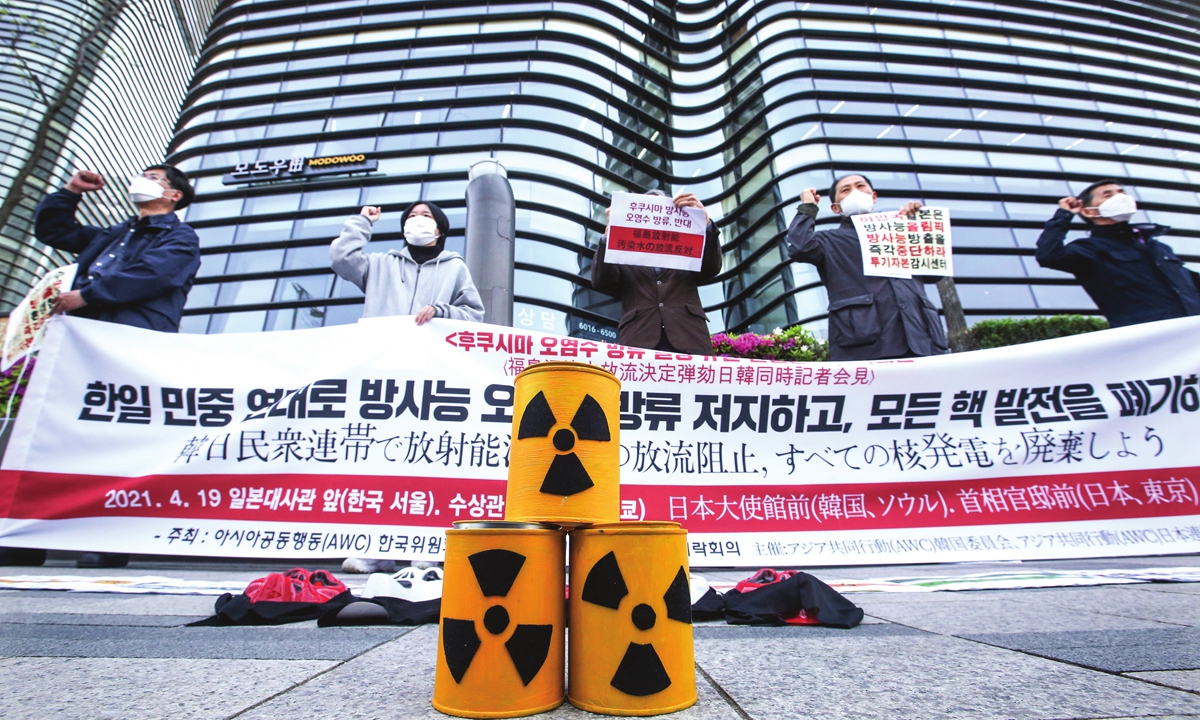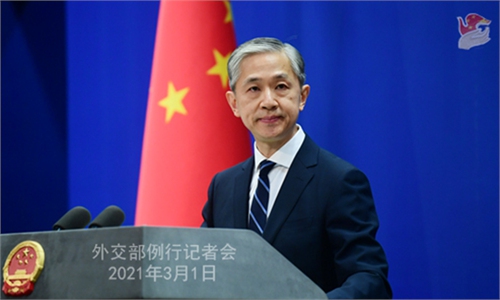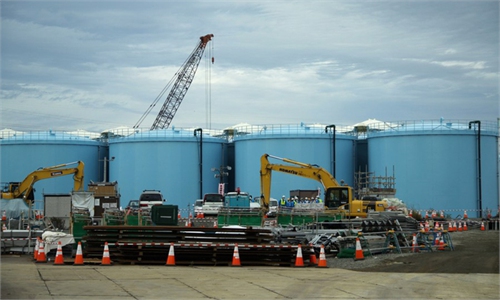Japan's plan of nuclear wastewater dumping an 'outrageous misconduct:' experts

Members of a civic group stage a rally to denounce the Japanese government’s decision on Fukushima water, in front of a building which houses the Japanese embassy in Seoul, South Korea, on Monday. Photo: VCG
Upon the Japanese government's announcement to release Fukushima's nuclear wastewater into the ocean, experts find it hard to believe the International Atomic Energy Agency (IAEA) to take a fair stance, suggesting that China needs to cooperate with the international community and leverage the two-year timeframe to explore solutions while getting a review process aligned.
"Japan was very clever to take advantage of [the] timing for the US-Japan summit," said Se Hyun Ahn, a professor of the Department of International Relations at the University of Seoul, in a written interview with the Global Times on Thursday.
Within the same week, right after the dumping decision, Japanese Prime Minister Yoshihide Suga visited the US. However, in the joint statement, there was no mention of nuclear wastewater.
Xu Bu, president of China Institute of International Studies, told the Global Times that as close neighbors of Japan, China and South Korea would be the biggest victims of Japan's nuclear wastes.
"Regarding the Japanese decision, China and South Korea, proceeding from the maintenance of the health of their people and the international marine environment, immediately expressed their serious concerns and opposition to the Japanese side and demanded that the Japanese side retract the wrong decision," Xu said.
China's Ministry of Foreign Affairs has summoned the Japanese Ambassador to China to make solemn representations and clearly put forward three requirements. The South Korean side also expressed similar positions and concerns to the Japanese side.
"I think the Chinese and South Korean governments will take this matter seriously and continue to follow up on this matter, and take necessary response measures depending on the development of the situation," Xu noted.
Ahn said that South Korea wants to get international attention and gather similar voices toward Japan.
Evaluating the impacts of the dumping on the China-South Korea-Japan cooperation, Xu said that cooperation among the three countries has made great progress over the past 20 years and has played a positive role in deepening mutually beneficial cooperation and maintaining regional peace, stability, and prosperity.
At the same time, issues such as insufficient mutual trust in political security and poor national sentiment have interfered with the process of trilateral cooperation from time to time. Regardless of the opposition of China and South Korea, Japan's decision to discharge nuclear sewage is typical beggar-thy-neighbor behavior, which will seriously undermine the political mutual trust and cooperation atmosphere of the three countries, and will also worsen the perception of Japan among the Chinese, and South Korean people, Xu stressed.
Fang Xiuyu, an expert in Korean Studies at Fudan University, told the Global Times on Sunday that comprehensive consideration is needed while handling the dumping matter.
She warned that the review process will need certain standards, adding "We should not make it into a political matter."
"China needs political wisdom and work with professional institutions including the IAEA and participate in the entire review process," she said.
Even though the dumping matter was not mentioned in the joint statement, Fang said that the US has been aware of Japan's plan to release all the time. Thus obviously the US government is applying double standards.
Xu said that the US' attitude is obviously not a scientific and responsible one, but a typical double standard. If the US government treats this matter from the perspective of maintaining the marine environment and human health and safety, it should urge the Japanese side to treat the issue of wastewater disposal with an honest, scientific, and responsible attitude, instead of being eager to justify and endorse Japan's wrongdoings.
Just because the US now needs Japan's alliance to curb China's growth and to stabilize its own position in the Asia-Pacific area, the US is ignoring the dumping matter, Fang noted.
Regional outlook
Ahn said that "not only on its [Japan's] neighbors, this is also a primary concern for Japanese people who consume tons of marine products. Japan has gone too far in this situation. Japan's decision to dump contaminated water on the ocean will not be justified by [the] international community."
Xu said that Japan's decision that harms regional national interests without fully communicating with China and South Korea in advance obviously violated the aforementioned commitments.
"Northeast Asia, where China, Japan, and South Korea are located, is one of the world's major economic centers with dense populations and active economies and trade. Japan's discharge of nuclear sewage into the ocean will worsen the regional marine environment, and the possible negative impacts on regional fisheries and tourism are incalculable. It may also have a long-term chain impact on the production and trade of aquatic products and agricultural products in the region," Xu pointed out.
Fang said that in the long run, China needs to explore resolution to the dumping matter from various channels to reason on the basis of international laws and regulations and to represent the voices of the people in regional countries.
Ahn said that Japan indeed prepared for this moment for the past 10 years, orchestrated by the former IAEA Director-General, Yukiya Amano. That "means whatever actions Japan makes, the IAEA would be on the Japanese side regardless of international ethics or values," he said.
"This is very outrageous misconduct! This is directly related to food, health, and national security," he added.
This does not help Japan's image and stance in regional security. Japan's relations with Korea will be more aggravated, Ahn added.
The discharge of nuclear sewage in Japan is a major issue related to human life and health and the global environment. This matter should be dealt with in a serious and scientific manner and should not be mixed with ideological considerations, and geopolitical factors, Xu said.
"We hope that Japan can show humility and honesty, and work with the international community including China and South Korea to properly handle this matter," he said.



